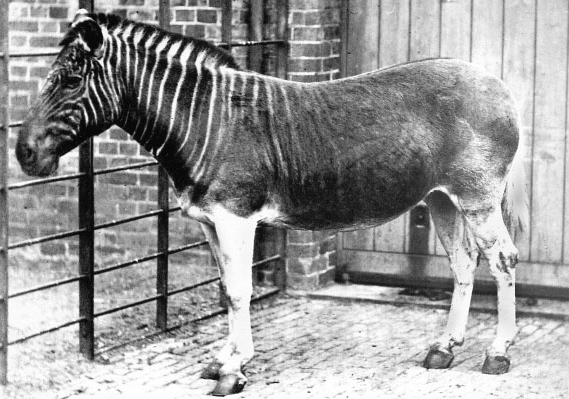 The quagga were an equine species, similar to the zebra but with stripes only on the head, neck and shoulders. They roamed the drier parts of South Africa between the Orange, Vaal and Great Kei rivers, forming large grazing herds with hartebeest, wildebeest and ostriches. Their name is derived from the onomatopoeic name given to them by the native Hottentot, mimicking the animals' call.
The quagga were an equine species, similar to the zebra but with stripes only on the head, neck and shoulders. They roamed the drier parts of South Africa between the Orange, Vaal and Great Kei rivers, forming large grazing herds with hartebeest, wildebeest and ostriches. Their name is derived from the onomatopoeic name given to them by the native Hottentot, mimicking the animals' call.
The European travellers who first discovered them thought the quagga to be differently patterned zebra, or even the female of the Burchell Zebra. In 1788, the German naturalist Johann Georg Gmelin classified the quagga as a separate species. However, later naturalists became aware of a great variation in zebra coat patterns, and as a result they reclassified the quagga as a sub-species of zebra.
European farmers spread into the quagga habitat during the eighteenth century. Having failed to domesticate the quagga, they hunted them not only for their meat and for their hides, but also for sport. A number of quagga were taken into captivity, including a breeding pair at London Zoo. Captivity did not suit the quagga stallion, which killed itself by beating its head on the walls of the enclosure, leaving the mare [pictured above].
Hunting and the grazing of domesticated sheep severely reduced the number of quagga in the wild. The last wild quagga died sometime in the 1870s, leaving the captive animals as the last examples of the species. On 12th August 1883, the last of these died: a mare held by the Artis Zoo in Amsterdam.
In 1955, the German zoologist Lutz Heck suggested that by selectively breeding plains zebra, a creature identical to the quagga could be produced. Following experimentation with quagga DNA, scientists confirmed that they were a sub-species of zebra. In 1987, the Quagga Project was established to try to restore the species.
Customised search for historical information
12 August 2009
On this day in history: The quagga became extinct, 1883
Labels:
Animals,
C19th,
Netherlands
Subscribe to:
Post Comments (Atom)















2 comments:
So sad. I hope they are able to bring it back, because losing a large species like that really shows our lack of caring as a species. We'll have to make sure that nothing like that happens to the species that we have left.
Conservation is much more of an issue these days than then, however, commercial necessity seems to mean that many species' habitats are being encroached upon still. This is something for future historians to consider.
Thanks for the comment.
Post a Comment